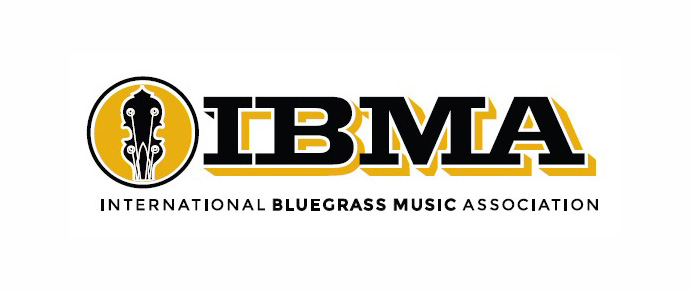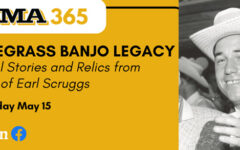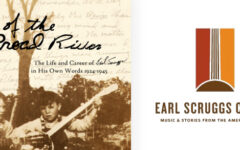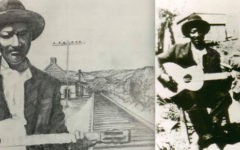
The International Bluegrass Music Association has announced a special, one-time round of additional Hall of Fame inductees to be honored at the grand re-opening of the Bluegrass Music Hall of Fame and Museum this fall. These five special inductees have been chosen over and above the three typically brought into the Hall during the annual International Bluegrass Music Awards show.
The new Museum in Owensboro, KY will be the permanent home of the Hall of Fame, a fact recognized in the name change from the International Bluegrass Music Museum.
The five special inductees will be recognized in a ceremony at the Museum on October 18. All are being honored posthumously for their lifetime contributions to the music.
Chosen for this unique honor this year are:
- Vassar Clements
- Mike Seeger
- Allen Shelton
- Jake Tullock
- Joe Val
The IBMA has put together thumbnail biographies for these highly influential artists, each of whom certainly belongs in the Hall of Fame.
Vassar Clements
Vassar Clements, born on April 25, 1928 in Kinard, Florida, began learning fiddle around the age of seven, picking up songs and instrumentals he heard on the Grand Ole Opry. He replaced Chubby Wise in Bill Monroe’s Blue Grass Boys during the tenure of Jimmy Martin and Rudy Lyle and recorded Monroe’s signature song, “New Muleskinner Blues,” among other tracks. Joining Jim and Jesse’s Virginia Boys in 1957, Clements created classic fiddle breaks like “Dixie Hoedown,” that were emulated by future fiddlers who held that post. Clements’ recordings with country star Faron Young established him as a prominent Nashville session player, where he became known for his generosity, sharing his time and his knowledge. In 1963, he married Millie Gandy who provided strong leadership as his agent and manager until her death in 1998.
Clements joined the Earl Scruggs Revue in 1970. The following year, he participated in the recording of the ultra-successful Will the Circle Be Unbroken album, garnering him many new fans and broad acclaim. He went on to work with musicians as diverse as Tony Rice, Stephane Grappelli, Buddy Spicher, Paul McCartney, the Allman Brothers, Bela Fleck, and Sam Bush. His last solo album was Living with the Blues. Vassar Clements succumbed to cancer on August 16, 2005.
Mike Seeger
Mike Seeger made significant contributions to the preservation and appreciation of bluegrass and old-time music. He was one of the first to capture high-quality live recordings of Flatt and Scruggs, Reno and Smiley, and Bill Monroe, among others. In 1957, he produced American Banjo Scruggs Style on Folkways record, believed to be the first bluegrass LP. He engineered and produced the Country Gentlemen records on Folkways as well, and contributed numerous liner notes and scholarly works.
Born August 15, 1933 into one of the first families of American folk music, including his half-brother, Pete, and his sister, Peggy, Seeger was a multi-instrumentalist from a young age, influenced by the African-American singer-guitarist Elizabeth Cotton, who lived with the Seegers. His career as a performer included cofounding the New Lost City Ramblers and playing with the Strange Creek Singers (with Hazel Dickens, Alice Gerrard, and Lamar Grier), as well as his own work as a solo artist. Beginning in the 1970s, he recorded a string of albums for Rounder Records. As director of the Smithsonian Folklife Company, Seeger compiled scholarly projects such as Southern Banjo Sounds (1998) and True Vine (2003). Honors include three GRAMMY nominations, a Guggenheim Fellowship, the Rex Foundation’s Ralph Gleason Award, and an IBMA Distinguished Achievement Award. Mike Seeger died in 2009.
Allen Shelton
Allen Shelton, born in 1936 near Reidsville, North Carolina, was one of the most influential and innovative bluegrass banjo players during the 1950s and 1960s. Known for his distinctive right-hand technique, the syncopated ‘bounce’ of his timing would influence other musicians, including the mandolin playing of Jesse McReynolds.
He began his bluegrass career at a young age, working with Hack Johnson and the Tennesseans, Mac Wiseman (with whom he recorded “Keep on the Sunny Side”), and Jim Eanes. Shelton helped record most of Eanes’ Starday Records material, including “Your Old Standby,” “I Wouldn’t Change You If I Could,” the original version of “I’ll Pretend It’s Raining,” “Hand on the Glass,” and “Log Cabin in the Lane.” He is perhaps best known for his contributions made during the six years he spent with Jim and Jesse McReynolds, including his showcase number “Bending the Strings,” and the recordings “I Wish You Knew,” “Sleepy Eyed John,” “She Left Me Standing on the Mountain,” and dozens more. Shelton retired from performing in 1966, but came out of retirement about 20 years later to rejoin Jim and Jesse. In all, Shelton recorded 89 cuts with Jim and Jesse, and in the process helped define their sound during the peak of their performing career. Shelton also released three albums under his own name. Allen Shelton died in 2009.
Jake Tullock
A multi-dimensional contributor to the sound and the stage show of Flatt and Scruggs and the Foggy Mountain Boys during their most popular and successful years, English P. “Jake” Tullock, Jr. did as much as anyone to establish the template for bluegrass bass playing. Born in Etowah, Tennessee in 1922, Tullock began his career as a guitarist and singer. Josh Graves persuaded him to take up the bass, and on that instrument Tullock worked for Esco Hankins, the Bailey Brothers, and Don Gibson.
In 1955, he joined Flatt and Scruggs for a short time, returning in early 1958, remaining for the duration of the Foggy Mountain Boys’ run. Tullock became increasingly prominent in the band, singing harmony after Curly Seckler’s departure, playing featured duets like “Little Darling Pal of Mine” with Scruggs to show off his considerable bass skills, and frequently contributing comedy in tandem with Josh Graves. During this period, thanks to Flatt and Scruggs’ popularity in person, on records, and on radio and television broadcasts, Tullock inarguably became the most visible and most widely heard bass player in bluegrass. After Flatt and Scruggs parted ways, Tullock played with Lester Flatt in the Nashville Grass until poor health led to his retirement in the spring of 1971. The Cousin Jake Bluegrass Festival in Etowah was founded in his honor in March of 1994, and continues to this day. Tullock returned to Etowah and worked as an overnight police dispatcher until shortly before his death in 1988.
Joe Val
Nicknamed by fiddler Tex Logan, “Joe Val” was born Joseph Valiante in Everett, Massachusetts. Val played guitar and banjo, but became well known for his mandolin playing and distinctive high tenor. While he made his living as a typewriter repairman, he played with several bands, including the Radio Rangers and the Berkshire Mountain Boys. Val helped blaze the trail for Boston’s folk and bluegrass scene with the Lilly Brothers in the early ‘60s, and later surrounded himself with that city’s top musicians including Joan Baez, the Charles River Valley Boys, and banjo legends Don Stover and Bill Keith. In 1970, Val formed his own band, the New England Bluegrass Boys, who recorded their first album in 1972 on Rounder Records, becoming the label’s first bluegrass act.
In 1984, Val was diagnosed with lymphoma and his last performance was at the 1984 Georgia Bluegrass Festival. The Joe Val Benefit, a fundraising event, was organized on June 9, 1985, to help cover the cost of treatment. Sadly, he died two days later. Honoring his legacy, the first memorial Joe Val Day was organized in 1986, and the event has since grown into the three-day Joe Val Bluegrass Festival. The festival won the IBMA Event of the Year award in 2006. In 1995, the IBMA posthumously presented Joe Val with an IBMA Award of Merit for his dedication and contributions to bluegrass music.
Kudos to the IBMA for bringing this group of worthy honorees into the Hall, and for making the reopening of the Museum something to celebrate.
The names of the three “regular” inductees for 2018 will be announced on July 25, along with the nominees for this year’s International Bluegrass Music Awards.







